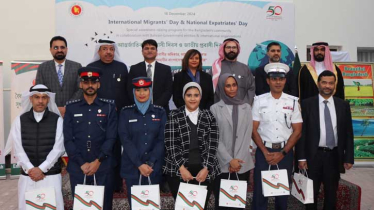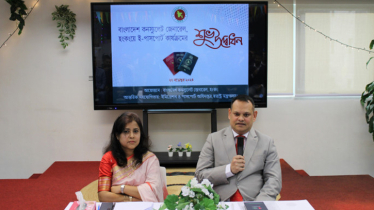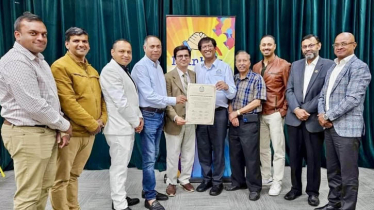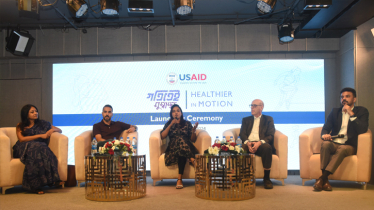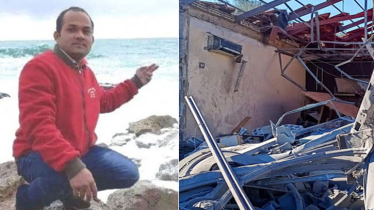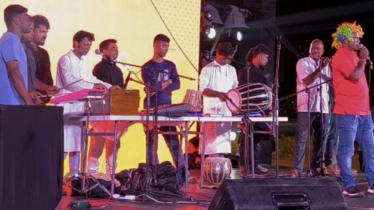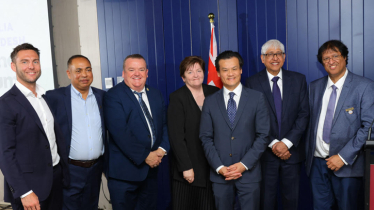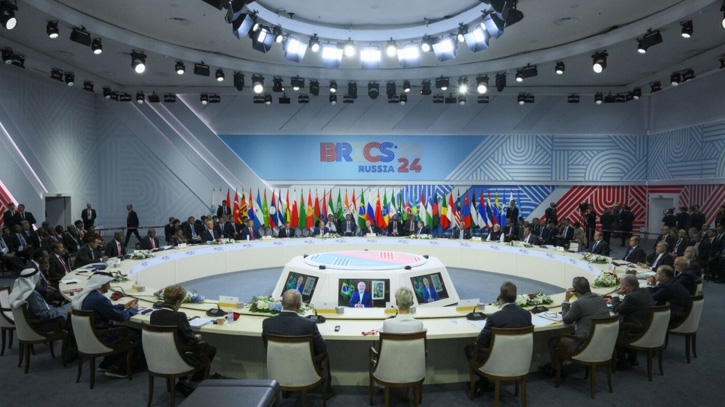
The 16th BRICS Summit took place in Kazan last week of this October under the Russian Chairmanship themed Strengthening Multilateralism for Just Global Development and Security. The summit hosted 36 leaders including the President of China, Prime Minister of India. Delegations from 35 countries and six international organizations participated in it. Secretary-General Antonio Guterres attended the summit and addressed leaders as “It takes a community of nations, working as one global family, to address global challenges”. The world has around 2.4 billion young people, they globally represent a significant force for change, essential for addressing contemporary challenges. Their creativity, innovation, and leadership skills can drive sustainable development and social progress. Engaging youth is crucial for world leaders to harness their potential, ensuring inclusive solutions for a better future. The UN Youth Strategy 2030 empowers young people by enhancing their participation in peace, security, and sustainable development. It aims to amplify their voices, improve access to education and health, and promote economic opportunities. As well as in BRICS Summit 2024, the Kazan declaration we have seen youth are mentioned in multiple spheres, especially in the section of strengthening people-to-people exchanges for social and economic development.
Followed by the BRICS Summit we have interviewed two youth representatives who have aspirations and students of international relations in Russian universities. We have interviewed Kamilla Albertovna Ishniiazova who is a leading specialist at the Ministry of Transport and Road Management of the Republic of Tatarstan and a student of International Relations at Kazan Federal University. And we interviewed Sofia Alexandrovna Suhomlina who is a student of International Relations at the Tomsk State University. We have asked both of them the same questions to answer and are writing here in a dialogue format.
Could you please tell us your experience at the BRICS Summit?
Kamilla: I worked at the summit as a protocol volunteer and I had the chance to see all the leaders of the core BRICS members. I was in the Leaders' Waiting Area lounge and was able to observe the negotiations between the presidents of Iran and Russia. A pleasant moment was when the head of the Republic of Tatarstan, where I am from, came over to check on how we (the volunteers) were doing. As an International Relations student, I found it fascinating to observe the organization of such a large-scale event from the inside and to see how many people put in their efforts to make everything run smoothly.
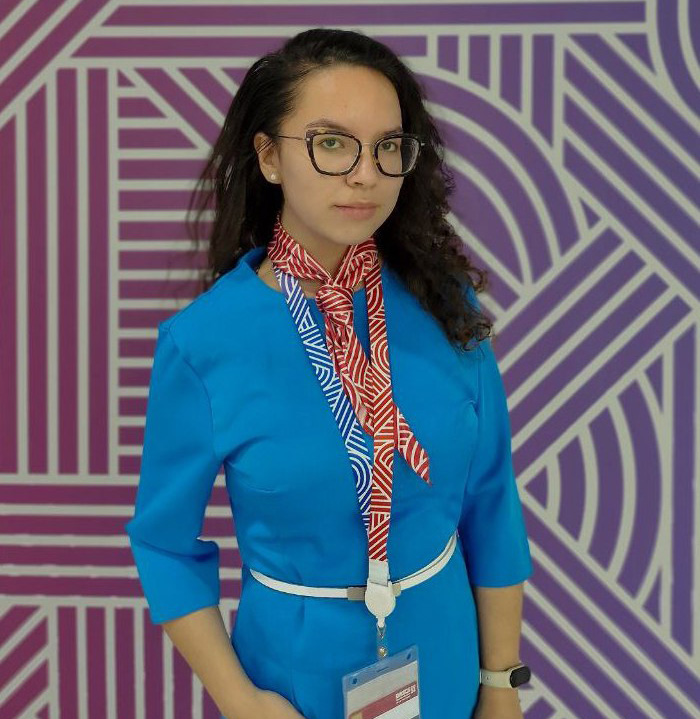
Photo: Kamilla Albertovna Ishniiazova
Sofia: So, my experience at the BRICS summit was very valuable for me as a student of International Relations. I was in the center of a global political event that turned the vector of developments of the multipolar worlds. Furthermore, I mainly helped in the places where the delegations lived. In my case, it was the Arab delegations and the Turkish delegation had it by the president. Erdogan, I helped with language translation and assistance for the delegations. Again, being a part of such a significant event was a great experience for me, and it gave me the confidence in my personal interest in global politics, in the shifting of the centuries in the political arena and the overall world politics that we can observe.
How do you perceive the role of BRICS in shaping the future of global governance in light of its recent expansion?
Kamilla: The expansion of BRICS demonstrates that more and more countries are interested in changing the existing world order and establishing a new, fairer global governance. It is particularly telling that longtime U.S. partners—the UAE and Saudi Arabia—have joined BRICS. Additionally, delegations from Europe, as well as Turkey, a NATO member, arrived in Kazan. This indicates that even the traditional partners of the West want to reduce their dependence on the dollar. From an economic perspective, trading in national currencies, thereby strengthening them, seems the most attractive option. Many speak of BRICS as an alternative to the Western system. However, it is important to remember that BRICS respects existing institutions and, in all its declarations, emphasizes a commitment to the principles of the United Nations. In this context, the attendance of António Guterres at the summit is particularly noteworthy. BRICS may currently lack many practical tools, but a large number of countries share its unifying ideas. BRICS represents a new political trend that aligns with the demands of the times.
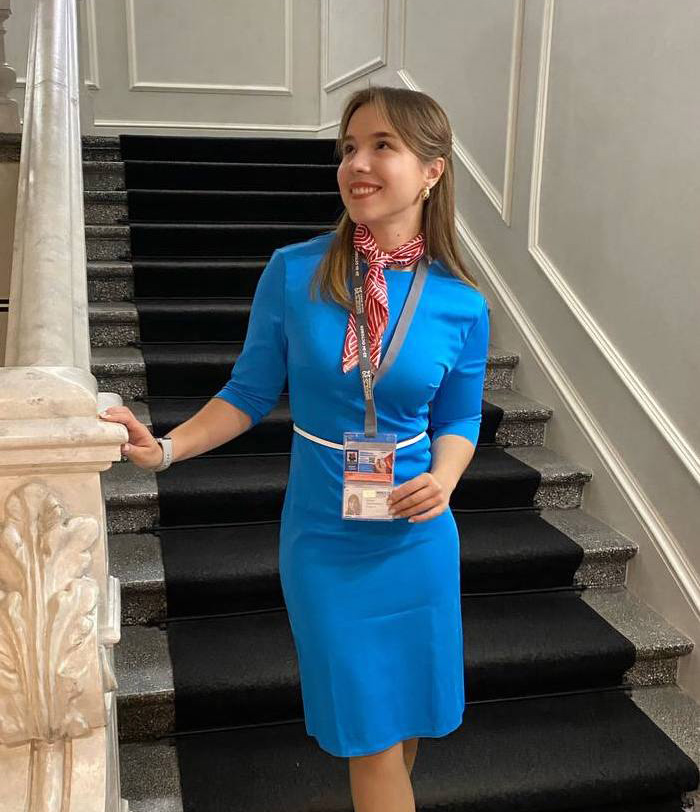
Photo : Sofia Alexandrovna Suhomlina
Sofia: Now, in my opinion, the BRICS is the leading growing organization. It includes countries with huge economic indicators, human resources, and diverse cultures ranging from Buddhism to Islam. Certainly, the entry of new members will give a strong impulse to the development of this organization in the political arena. Furthermore, there are plans to introduce a single currency within the BRICS, which will further strengthen the economic role of the BRICS. This summit made it clear that the world is changing, the main players are changing, and new ones are being added. And in the future, it will be a diplomatic powerhouse, where the countries of the Global South can become full-fledged members of the organization. Then BRICS will embrace the whole world.
In your opinion, how can young students and professionals contribute to the discourse on international relations within the context of BRICS and the Global South?
Kamilla: I believe that young students and professionals are already engaged in discussions about international relations in the context of BRICS and the Global South. I personally participated in the educational projects "BRICS International School 2023" and "BRICS Youth Summit 2024," where young people from BRICS countries and the Global South met, discussed cooperation prospects and proposed new ideas. These are not the only projects. There are quite a few now, especially in the BRICS context. However, not everyone is aware of them. In this regard, I think it’s important to raise awareness about existing platforms so that everyone has the opportunity to participate and share their views.
Sofia: So, as this year has shown the role of youth in the developments of the BRICS organization is tremendously important. A huge number of international youth forums on the BRICS were held where students could express their vision of the future politics and the role of countries on the world stage, our youth are our future. That's why the BRICS actively encourages youth cooperation. Moreover, I'm sure that with the expansion of BRICS, young people from all over the world will be able to share their thoughts and experience in order to build our own future together. Therefore, I hope that young people will also be able to have a voice in this organization and debate on international relations and diplomacy as they did this year.

